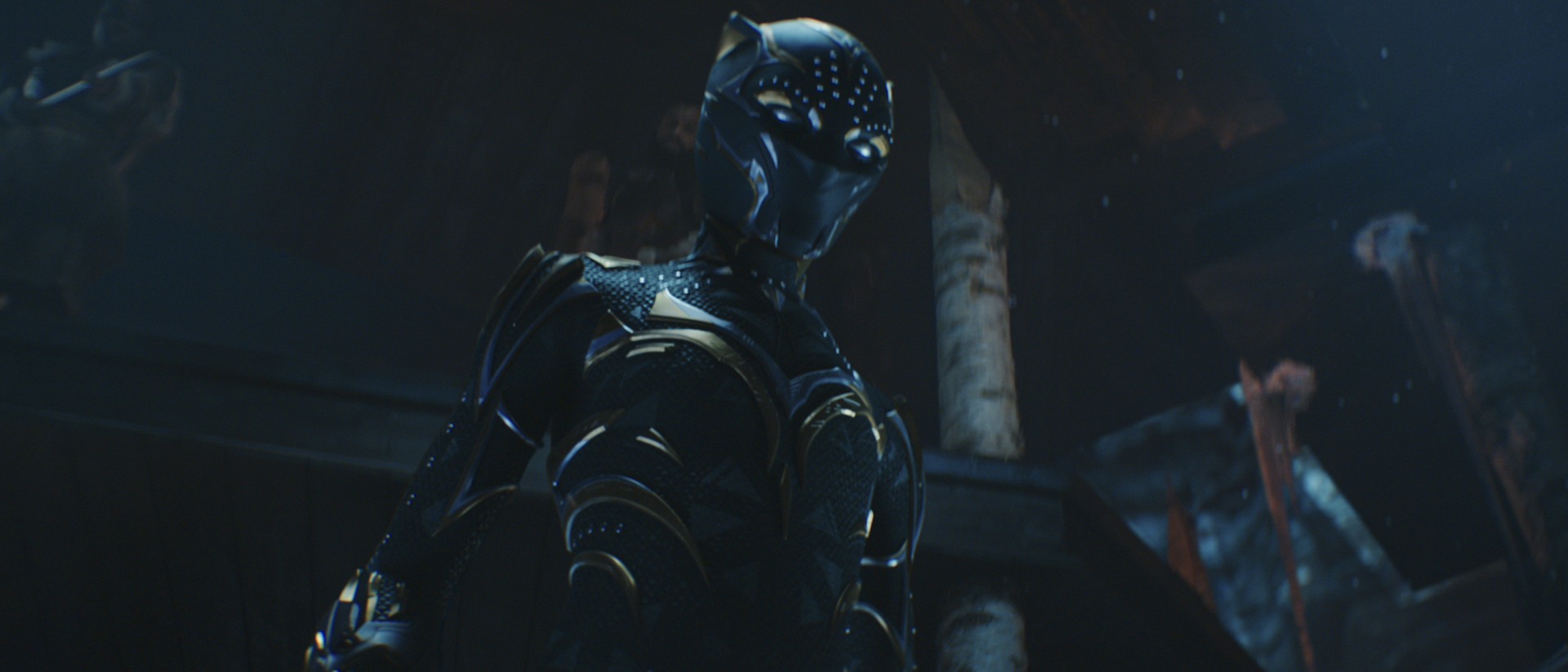TechRadar Verdict
Black Panther: Wakanda Forever is one of those incredibly rare superhero movie masterpieces. It's an emotionally raw, thematically dense, and culturally important movie that deserves every bit of praise that'll come its way. With its beautifully poignant celebration of Chadwick Boseman's life and Marvel legacy, coupled with the majesty of its entire production value, Wakanda Forever isn't just a top-tier Marvel flick – it's one of the best films in recent memory.
Pros
- +
Fitting tribute to Chadwick Boseman
- +
Emotionally impactful
- +
Thematically rich
- +
Funny and action-packed
- +
Culturally striking
- +
Beautifully filmed and acted
Cons
- -
Final moments of climactic battle a little lacking
Why you can trust TechRadar
- In theaters on November 11
- Final movie in Marvel's Phase 4 slate
- Sequel to 2018's Black Panther
- Set one year after T'Challa's death
- Ensemble cast includes Letitia Wright, Angela Bassett, Winston Duke, Lupita Nyong'o, and Danai Gurira
- Tenoch Huerta and Dominique Thorne make debuts as Nāmor and Ironheart
- Directed by Ryan Coogler
- Co-written by Coogler and Joe Cole
- Watch Wakanda Forever on Disney Plus
More than any other Marvel movie, Black Panther: Wakanda Forever has near-impossible expectations to live up to.
Its predecessor – 2018’s Black Panther – is a thematically dense, revolutionary inclusive film, which grossed over $1 billion at the global box office and changed the game where superhero movies are concerned. Equally, its impressive production value ensured Black Panther fully deserved its multiple 2019 Oscar nominations, including Marvel’s first-ever Best Picture recommendation.
Ordinarily, such success would increase the pressure on a film franchise’s sophomore entry. But Black Panther: Wakanda Forever has the added, emotional burden of upholding the legacy of Chadwick Boseman – the movie series’ main star – who unexpectedly died in August 2020 after a four-year battle with cancer.
And yet this Marvel Cinematic Universe (MCU) film isn’t weighed down by the enormity of its situation. The final MCU Phase 4 film is a profoundly moving triumph; an emotionally raw, prodigiously epic Marvel movie that not only celebrates Boseman’s life and MCU legacy, but also acts as a flawless bookend to Marvel’s most experimental and divisive cinematic phase.
The king is dead
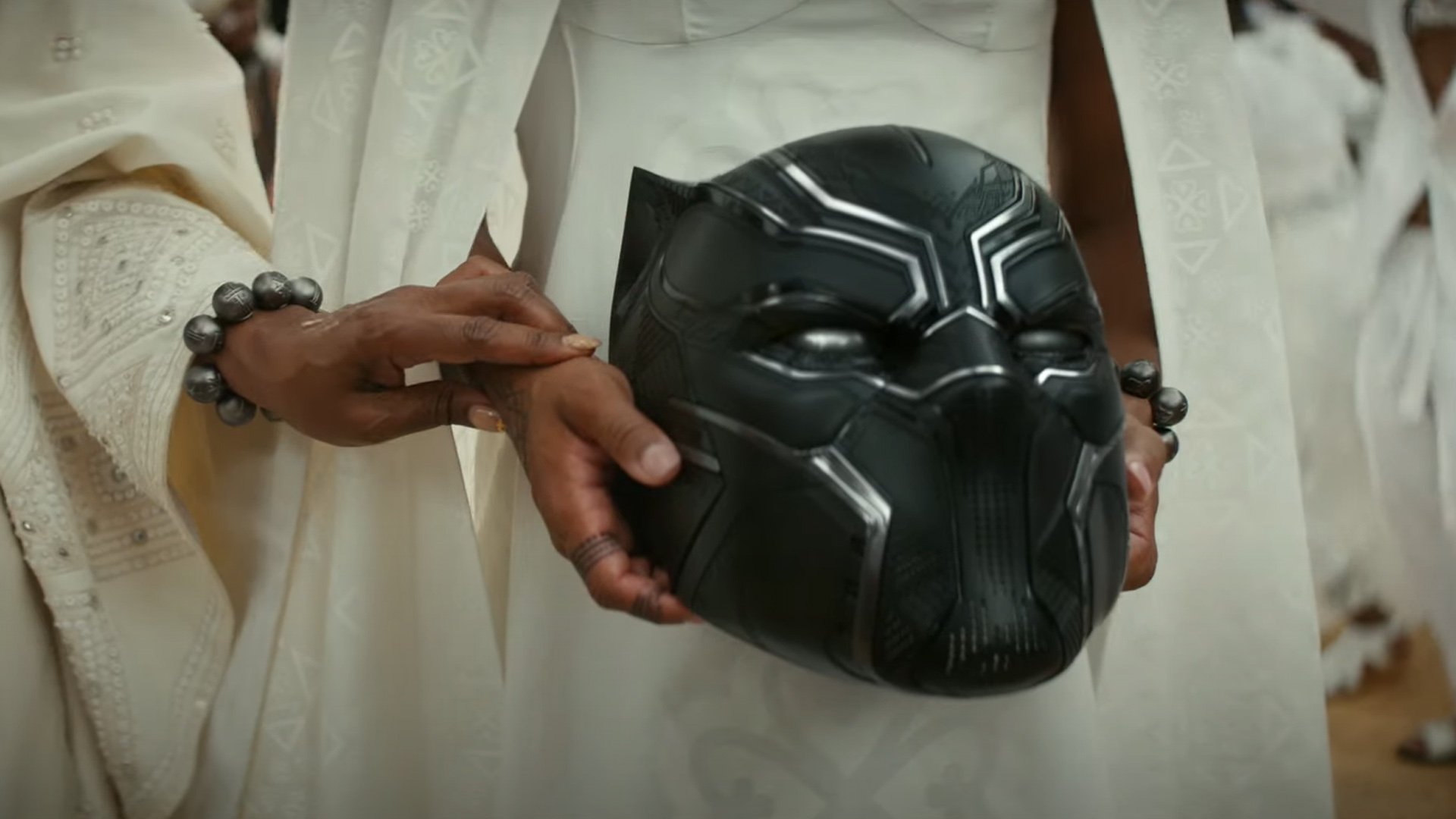
Wakanda Forever’s main story opens one year after the death of T’Challa, Wakanda’s king and the African nation’s superpowered protector, aka the Black Panther.
Unsurprisingly, those closest to T’Challa are struggling to move on from his passing. Shuri (Letitia Wright), T’Challa’s genius-level younger sister, has thrown herself into her work to distract from losing her sibling. Nakia (Lupita Nyong’o), T’Challa’s true love, has left Wakanda for reasons unknown. Okoye (Danai Gurira), leader of Wakanda’s Dora Milaje, feels empty with no monarch left to protect. Even M’Baku (Winston Duke), leader of the Jabari tribe, has been affected by T’Challa’s death.
It’s left to Queen Regent Ramonda (Angela Bassett), T’Challa’s mother, to lead Wakanda through another chaotic period. With no Black Panther to protect the vibranium-rich kingdom, mercenaries and the emergence of a secret world superpower – Talokan, led by Nāmor (Tenoch Huerta), the MCU’s first official mutant – threaten Wakanda’s peace and existence. It’s up to the realm’s remaining heroes to unite and defend their home from multiple dangers.
Sign up for breaking news, reviews, opinion, top tech deals, and more.
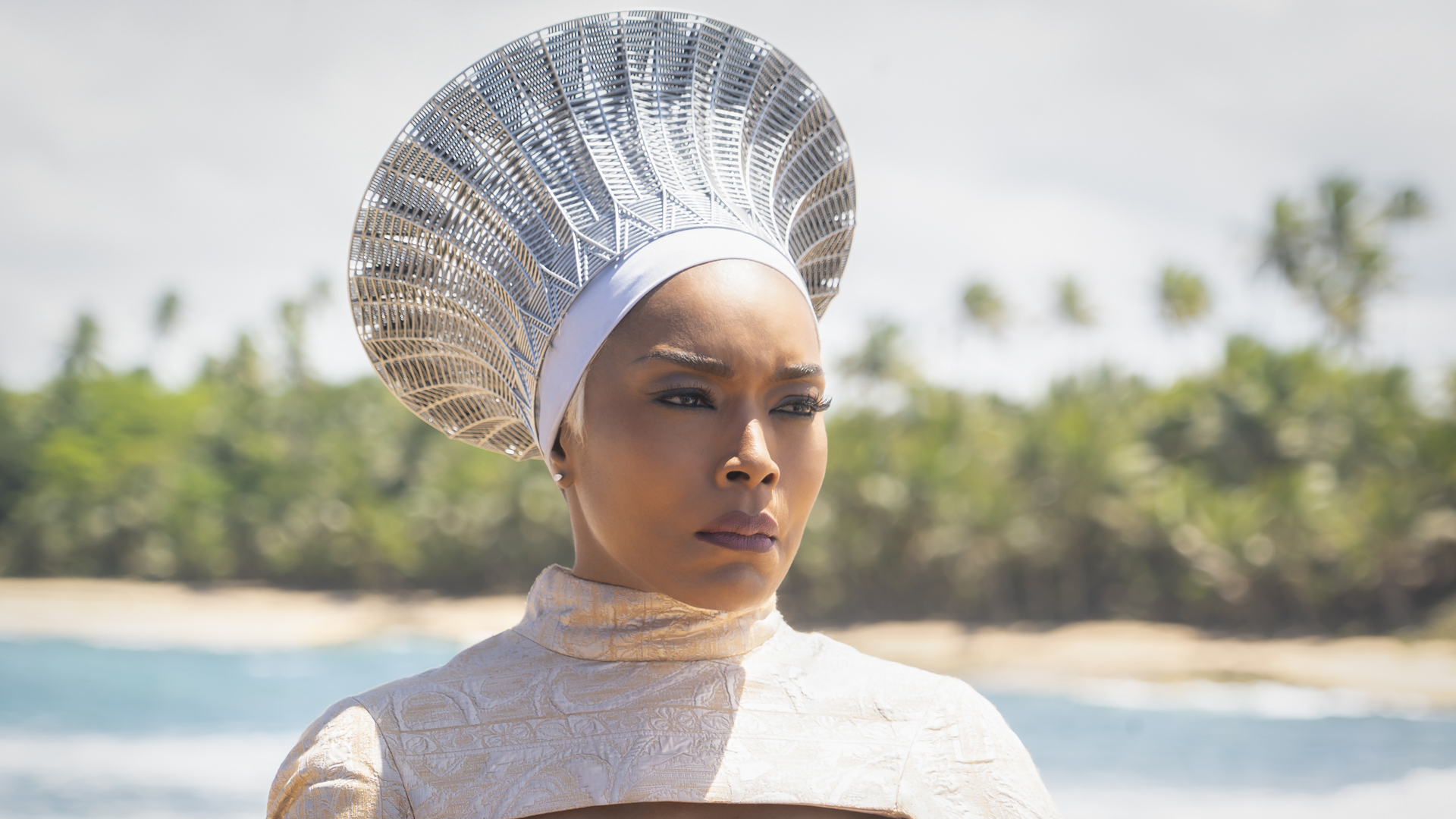
Before they can do that, though, Wakanda’s major players must reconcile with themselves and each other over T’Challa’s death – and that’s easier said than done.
Boseman’s passing is still indelibly raw among the movie’s cast and crew. Given their positioning in front of the camera, it’s the former where this is most evident. The unimaginable loss felt among the cast’s individual and collective displays is potently tangible, with Wright, Bassett, and Gurira delivering particularly impactful performances. The three women are emotional powerhouses, furnishing an already incredibly moving narrative with heartbreaking drama, maternal strife, and fury-fuelled scenes that regularly leave a lump in the throat.
Wakanda Forever revels in Mesoamerican customs, history, and ways of life to awe-inspiring effect
The MCU is fictional but the excruciating anguish and pain over Boseman’s passing (and T’Challa’s by proxy) is unmistakably real. At times Wakanda Forever makes for a genuinely distressing, emotionally disorienting watch. It’s the movie equivalent of the five stages of grief, with individual characters lingering in specific phases of mourning, or somehow making it through the grieving process.
Whether it’s Shuri – marooned in the denial and anger stages – or Nakia, who’s further along in the process, Wakanda’s protagonists are physical embodiments of each stage. In turn, they admirably guide viewers through their own journey of bereavement to find some solace over Boseman’s death. It helps that Wakanda Forever is, without spoiling anything, bookended by a cold open and deeply intimate final sequence that pay homage to Boseman, and provide cathartic release for characters and audiences alike. It's moments like this that find a semblance of joy amid the comprehensive sadness and root Wakanda Forever in its mature exploration of grief in a highly sensitive fashion.
If 2018’s Black Panther was a culturally and socially significant step in the right direction for the superhero genre, Wakanda Forever places an direct focus on inter- and intrapersonal relationships. Its deeply introspective exploration of insurmountable loss, and still having the courage to move forward, is powerfully moving. Equally, its examination of losing your sense of identity in the wake of unimaginable grief, and reframing yourself through the resultant healing process, is an emotional rollercoaster of weighty proportions.
My enemies call me Nāmor
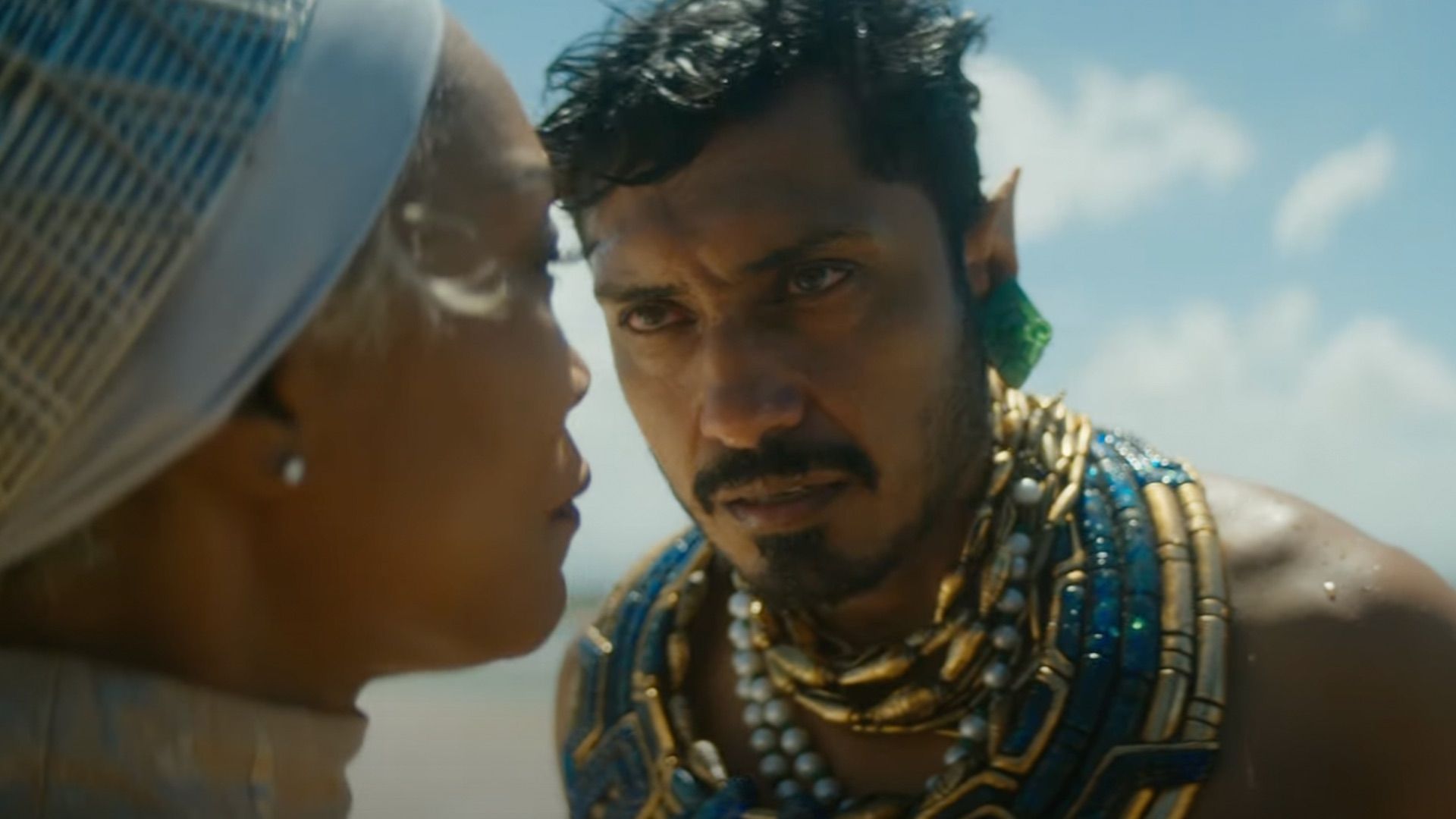
The trauma of T’Challa’s death isn’t the only battle these characters must overcome. The arrival of Huerta’s Nāmor and his fellow Talokanil, an ocean-dwelling human-like race, adds palpable tension to proceedings through their disparate worldviews and souped-up abilities.
With Talokan – the MCU’s version of Atlantis – making its live-action debut in Wakanda Forever, the expository lore drop concerning its creation (and that of the Talokanil) is inevitable. The way it’s woven into the narrative, though, is highly satisfying, with the origins of Nāmor, his people, and Talokan being told in a legitimately compelling fashion. Sometimes, plot exposition dumps can slow a movie’s pacing. Here, that’s pleasingly not the case; co-writers Ryan Coogler (also on directorial duties) and Joe Cole finding the right time to move away from Wakanda and other surface world storylines to fully immerse audiences in the Talokanil’s wonderful water-filled world.
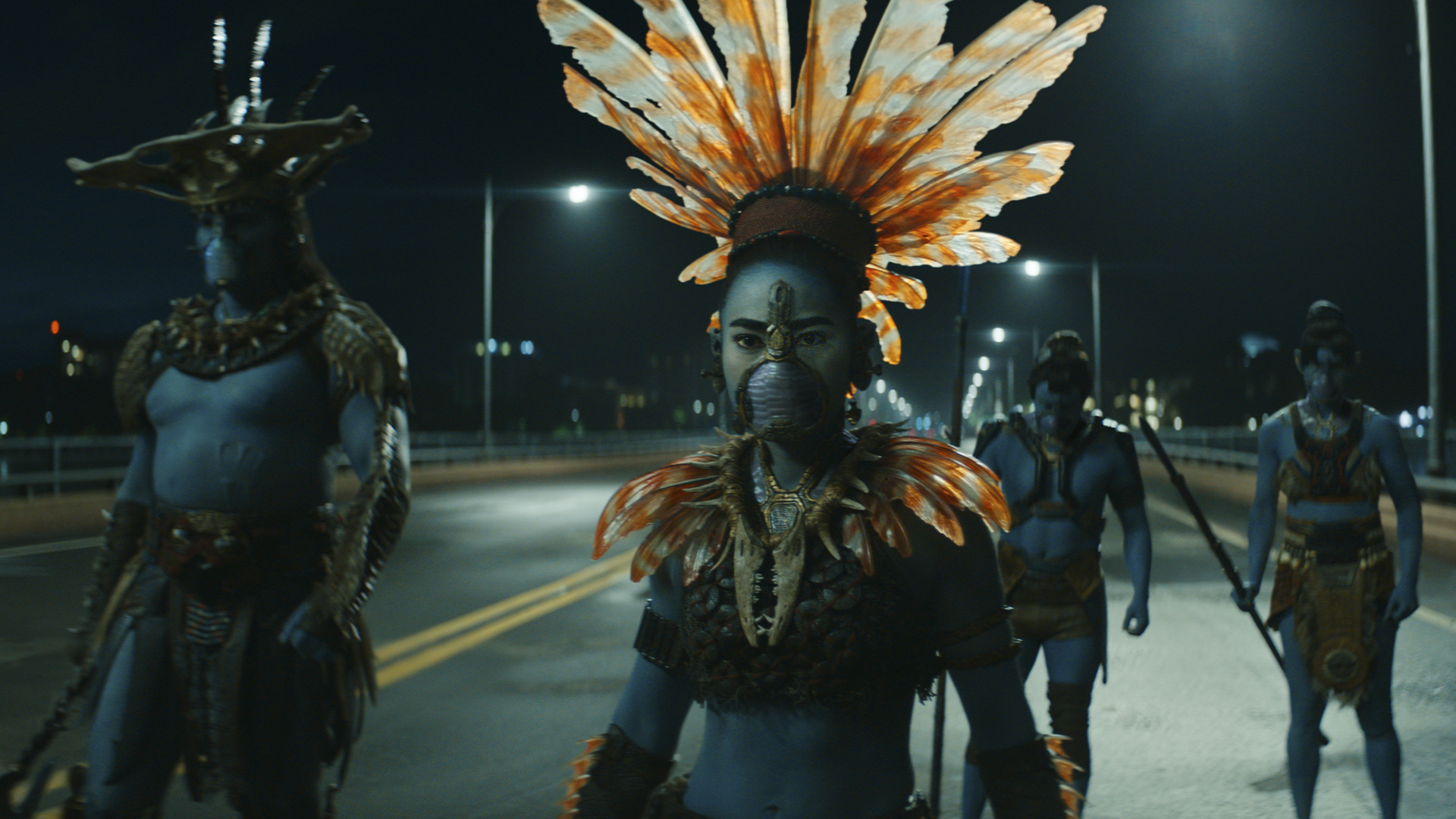
And breathtakingly beautiful it is. Just as 2018’s Black Panther was a celebration of African culture and traditions, Wakanda Forever revels in Mesoamerican customs, history, and ways of life to awe-inspiring effect.
Talokan’s visuals – CGI or otherwise – are sure to draw comparisons with DCEU flick Aquaman and, perhaps unfairly in some instances, James Cameron’s genre-defining Avatar, which are primarily set underwater. Even so, Marvel does a great job of depicting life under the sea, showcasing the similarities between the MCU’s two secretive kingdoms with a serenity that, until Talokan’s introduction, is largely lacking from proceedings. That absence of peacefulness is to be expected, though, given the thematic and emotional gravitas of Wakanda Forever. Marvel even plays with the mythos surrounding mermaids when the Talokanil are first introduced, with some suspense-riddled and dread-inducing scenarios used to thrilling effect.
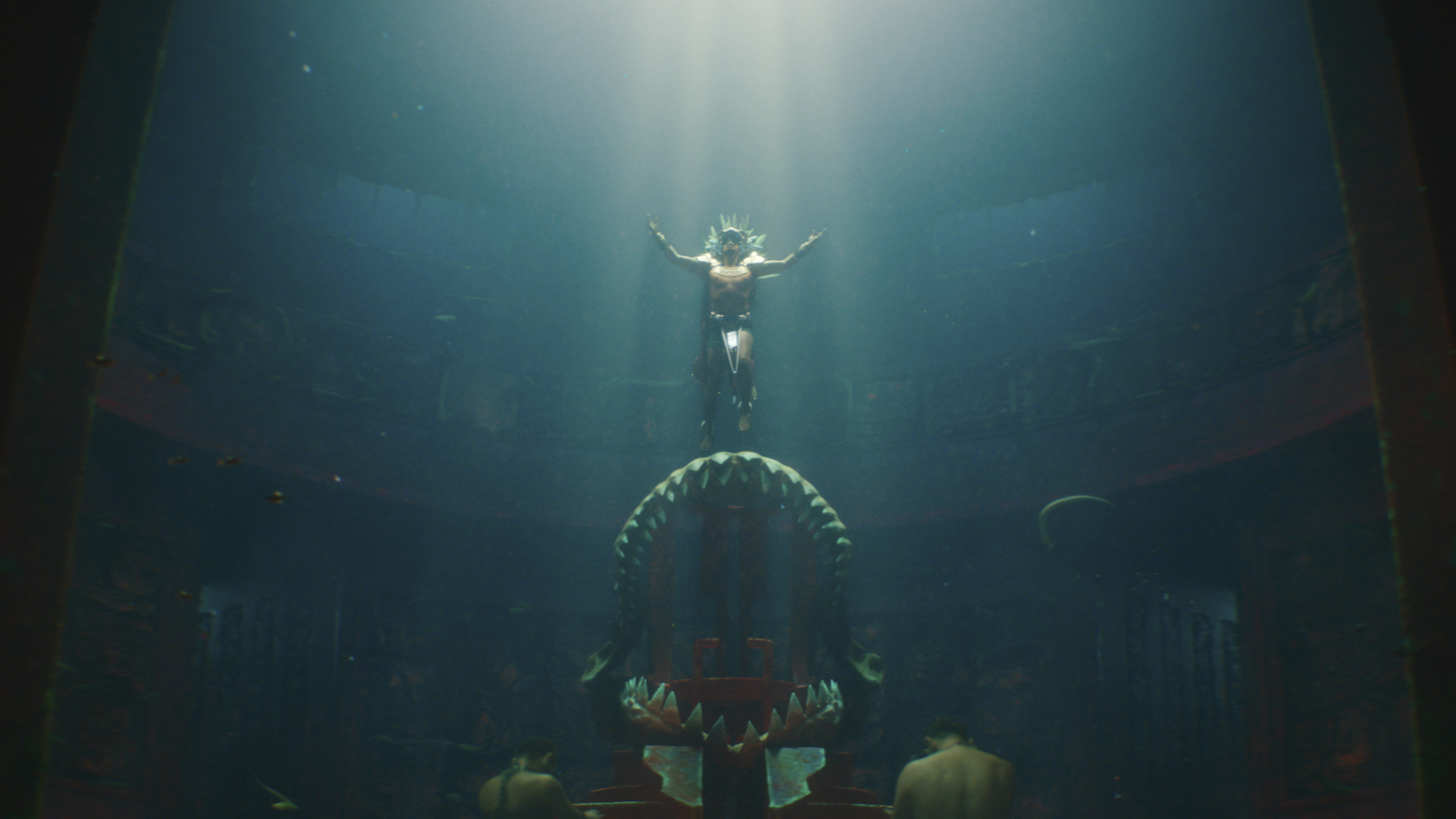
In Nāmor, Wakanda Forever possesses an intimidating if flawed antagonist. Unlike Black Panther’s Erik Killmonger or even The Infinity Saga’s Thanos, he’s less of a tragic villain and more of an anti-hero. However, that doesn’t mean he’s immune to antagonistic decisions. At times, Nāmor is a cold, calculating individual who’s unafraid to take the fight to Wakanda and the wider world.
Sure, his actions are arguably justifiable – his primary objective is to keep his country and people safe, so he’ll go to any lengths to ensure they stay hidden from view. How he goes about ensuring Talokan’s protection, though, differs wildly from the perspective of Ramonda and Shuri. It’s what makes Nāmor’s frosty dynamic with Wakanda’s leading ladies so captivating, with Shuri and Nāmor’s connection making for particularly entertaining viewing due to their analogous and contrasting viewpoints.
Still, despite his villainous positioning, you can’t help but admire what Nāmor stands for and ponder whether he warrants your support. That’s largely down to the charming menace Huerta imbues Nāmor with, the Mexican actor delivering a delightful devilish display in the character’s first-ever live-action MCU appearance.
Heart of the humor and action
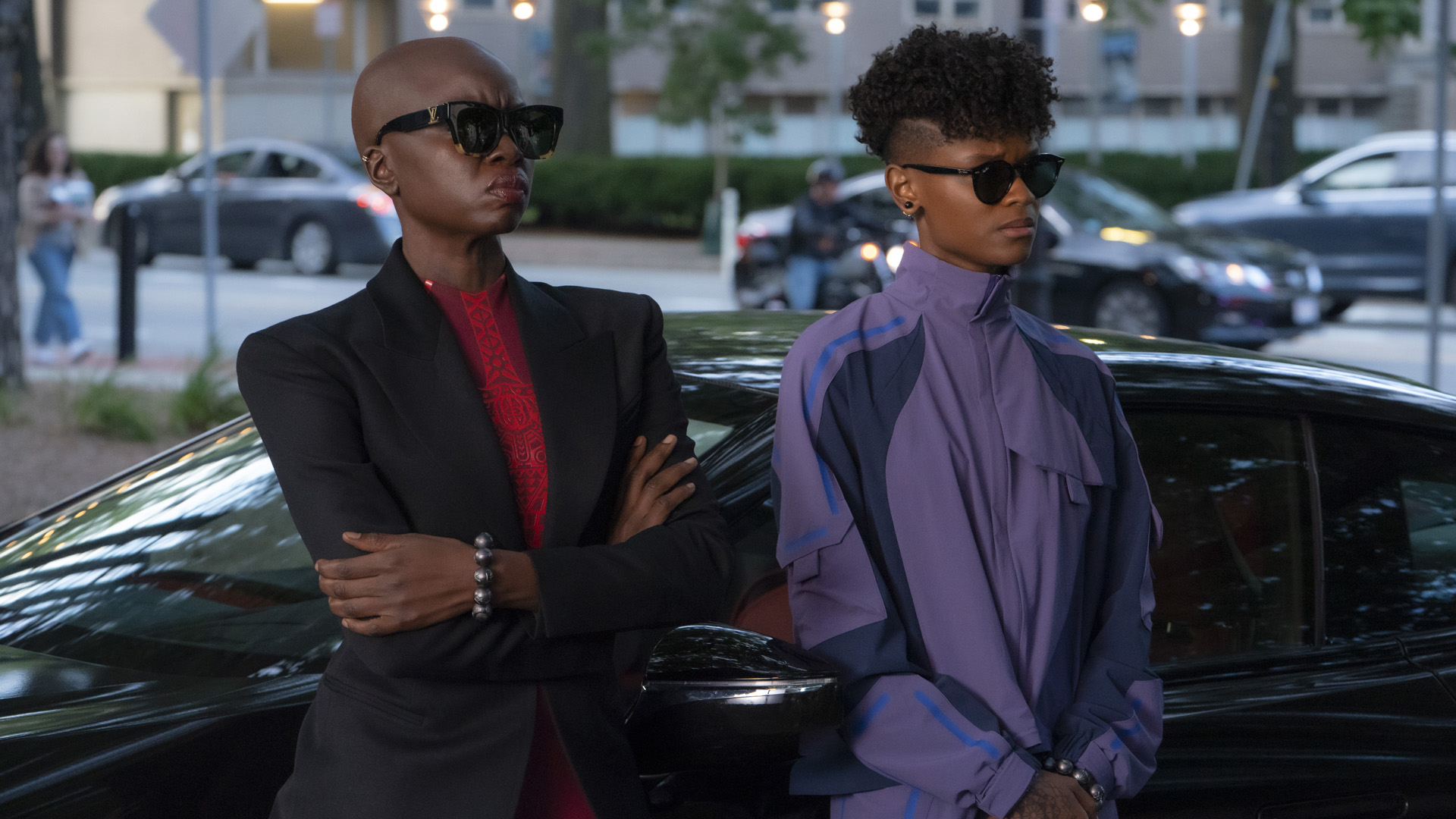
Wakanda Forever doesn’t sacrifice key MCU staples like action and humor regardless of its serious and somber mood. There are plenty of amusing moments scattered throughout, with Dominique Thorne’s Riri Williams – like Nāmor, she makes her MCU debut here – the instigator for many of Black Panther 2’s funniest scenes.
In fact, it’s Thorne’s Williams, rather than Huerta’s Nāmor, who is the true breakout star from the 30th Marvel movie. Thorne brings a huge helping of sass and spice to the story, with her university dorm room conversation with Shuri and Okoye a particularly humorous highlight. Coupled with her obvious parallels to Iron Man – Williams goes by the superhero pseudonym Ironheart – Thorne is sure to go down a storm with audiences. Her own Disney Plus show, which launches sometime in 2023, can’t come soon enough off the back of this highly enjoyable MCU introduction.
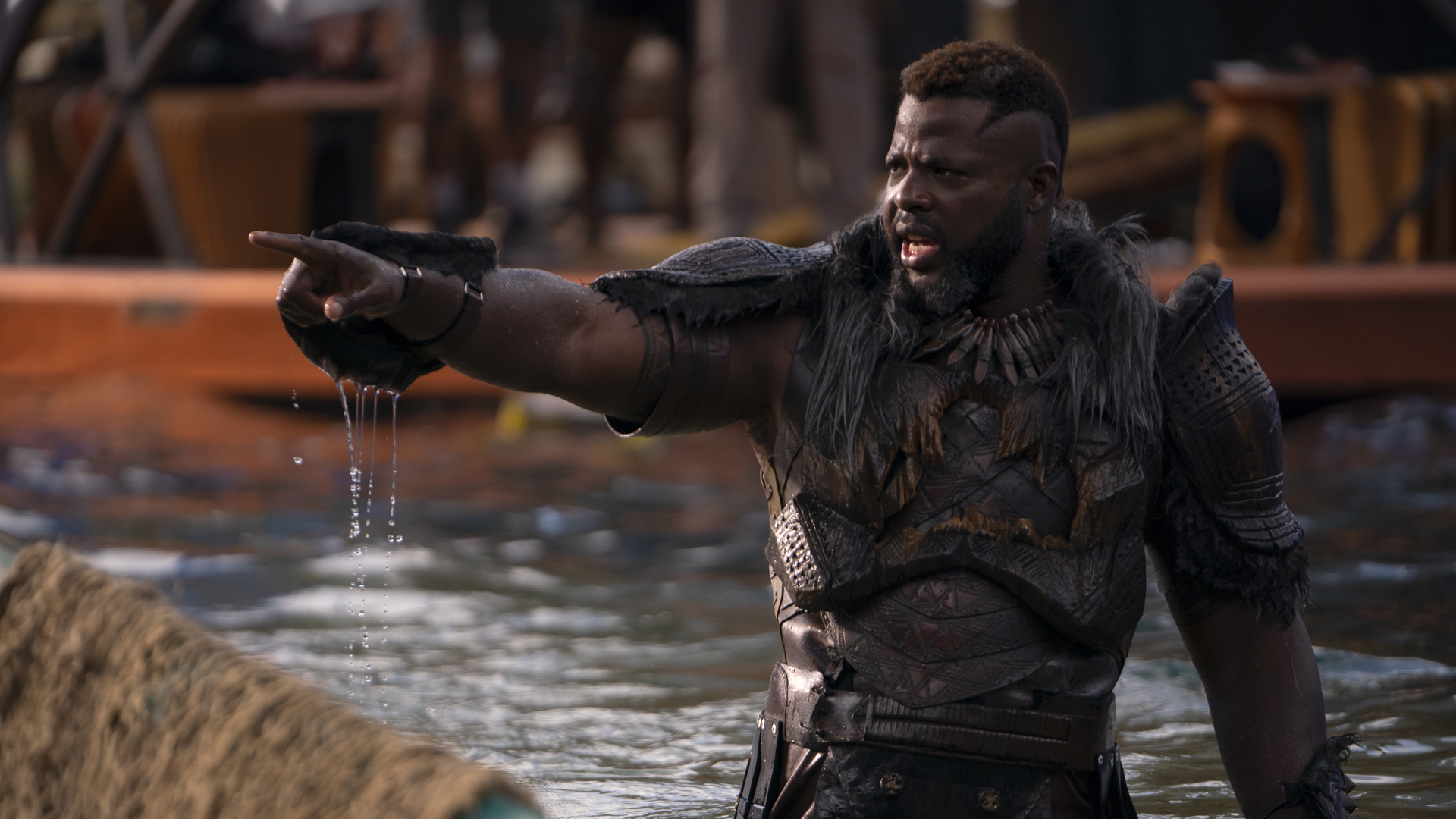
Like other recent MCU superheroes, including Doctor Strange 2’s America Chavez, Ironheart can hold her own in a fight. Contextually, that’s extremely helpful in Wakanda Forever, with Marvel’s latest film featuring lots of riveting and high-octane action.
Whether it’s a rousing one-on-one battle between Okoye and Attuma (or the new Black Panther and Nāmor) or the movie’s two tentpole set-pieces, Black Panther 2 goes all out to dethrone its predecessor in the physical battle stakes. Mainly, it does a great job doing so, but there are a few instances where the CGI is a bit janky and, especially during those ensemble action sequences, some scenes jump a bit too much from an editing approach.
Wakanda Forever makes for a genuinely distressing, emotionally disorienting watch
If there’s one more noticeably large snag in Wakanda Forever’s otherwise expert crafting, it’s the end of its climactic battle and how it mirrors 2018’s Black Panther. It isn’t the actual resolution of this colossal fight that’s slightly irksome – given Wakanda Forever’s official ending, rumors of a Nāmor spin-off, Ironheart’s TV show, and a likelihood of a third Black Panther film, there’s more to explore from Wakandan and Talokanil standpoints.
Instead, it's how the conclusion to Black Panther 2’s epic showdown resembles its forebear. It’s not a carbon copy, but Wakanda Forever occasionally follows the same conflict-based narrative beat for beat. It’s a small blemish on the film’s copybook and, for some viewers, it won’t ultimately matter in the circumstances. For others, though, it’ll be a tad disappointing.
Our verdict
Black Panther: Wakanda Forever is an intimately human, highly resonant piece of cinema. It serves its dual purpose of honoring Boseman’s legacy and posthumously moving the Black Panther series forward in novel and spectacular ways without straying far from Marvel’s big-screen-winning formula. Its saluting of sisterhood and illuminating Latino representation are equivalently worthy of praise.
At its core, Wakanda Forever is a tale of familial heartbreak – and that’s something we can all relate to. This is a Marvel movie with big narrative stakes, impressive visuals, dollops of humor, and thrilling action scenes. But it’s the quieter, more private moments that drive Wakanda Forever’s story and let each member of its stunning ensemble cast shine.
Marvel’s Phase 4 movie slate has been hit and miss. However, there’s no denying that when it gets it right, it gets things spot on – and Wakanda Forever is proof of that. Spider-Man: No Way Home was easily the best Phase 4 film until this point, but it’s a testament to the sheer masterpiece that Black Panther 2 is that Spidey’s third MCU movie has now been usurped. Simply put, it’ll take something truly spectacular – most likely Avengers 5 or 6 – to dethrone Black Panther: Wakanda Forever as the best Multiverse Saga movie.
Black Panther: Wakanda Forever lands in theaters worldwide on Friday, November 11.
As TechRadar's senior entertainment reporter, Tom covers all of the latest movies, TV shows, and streaming service news that you need to know about. You'll regularly find him writing about the Marvel Cinematic Universe, Star Wars, Netflix, Prime Video, Disney Plus, and many other topics of interest.
An NCTJ-accredited journalist, Tom also writes reviews, analytical articles, opinion pieces, and interview-led features on the biggest franchises, actors, directors and other industry leaders. You may see his quotes pop up in the odd official Marvel Studios video, too, such as this Moon Knight TV spot.
Away from work, Tom can be found checking out the latest video games, immersing himself in his favorite sporting pastime of football, reading the many unread books on his shelf, staying fit at the gym, and petting every dog he comes across.
Got a scoop, interesting story, or an intriguing angle on the latest news in entertainment? Feel free to drop him a line.
